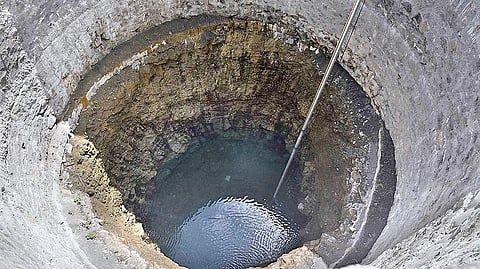

CHENNAI: The groundwater levels in 26 districts of Tamil Nadu have witnessed a significant drop compared to April last year, exacerbating the water shortage across the state. Eleven districts, however, have seen a slight improvement in the water table.
According to the Water Resources Department’s (WRD) groundwater data for the month of April accessed by TNIE, some of the western districts have witnessed the steepest decline in water level.
For instance, the average depth at which groundwater is available in Dharmapuri plummeted from 5.78 metres last April to 8.98 metres this year. Similarly, in Namakkal, the level dropped from 6.15 metres to 9.34 metres. Salem, Krishnagiri and Tiruppur are some of the other western districts that saw a significant drop. Coimbatore was among the worst hit, with water level dropping from 9.4 metres to 10.85 metres compared to last year. On an average, Chennai region has witnessed a 0.5 metre dip in groundwater level.
Other districts that saw significant decline include Perambalur, Tiruchy, and Tirupattur (see table). In contrast, groundwater level has gone up in the southern districts of Tirunelveli, Tenkasi, Thoothukudi, and Virudhunagar due to the heavy rain during northeast monsoon which led to flooding in many areas in these districts. K Balasubramani, general secretary, Tamil Nadu Vivasayigal Munnetra Kazhagam, expressed concern over the poor efforts by the state in promoting rainwater harvesting. “The impact of dwindling water level is acutely felt by farmers particularly in the western regions where groundnut, coconut and other cash crops are traditionally grown,” he said.
TN’s budget for water management insufficient, says farmers association
“This year, due to water scarcity, farmers have refrained from sowing crops. The situation is grim in Mettur Dam, a vital water source for irrigation and drinking purposes, which has dried up entirely, leaving farmers anxious about the future,” Balasubramani said.
KV Elankeeran, president of the Federation of Cauvery Delta Farmers Association, said, “It is essential to raise awareness about rainwater harvesting among farmers and the public to replenish the state’s groundwater levels.” He also noted that existing rain harvesting tanks are in disuse.
Echoing these concerns, a senior WRD official told TNIE, “The budget allocation by Tamil Nadu for water management compared to neighbouring states like Karnataka and Andhra Pradesh is insufficient.”
The WRD’s dependency on external funding agencies like Japan International Cooperation Agency to implement vital projects is also delaying projects. However, efforts are under way to convert non-functional borewells into rainwater-recharging units to improve groundwater levels, the official said.
In an attempt to address these challenges, the state planning commission and WRD are collaborating with experts and farmers to implement updated water policies introduced in 1994 and 2012, the official said.